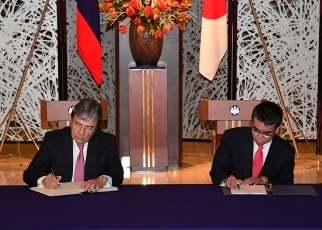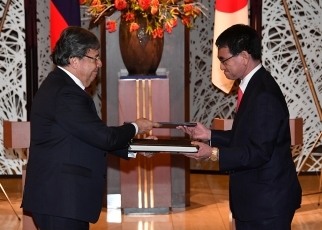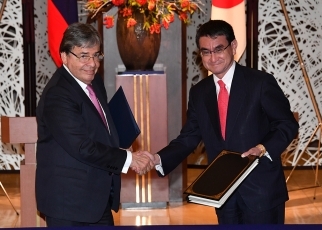Press Releases
Signing of Tax Convention between Japan and Colombia



1. On December 19 (Wednesday), “Convention between Japan and the Republic of Colombia for the Elimination of Double Taxation with respect to Taxes on Income and the Prevention of Tax Evasion and Avoidance” (Convention (English) (PDF) / Convention (Japanese) (PDF)
/ Convention (Japanese) (PDF) / Changed Notes (English) (PDF)
/ Changed Notes (English) (PDF) / Changed Notes (Japanese) (PDF)
/ Changed Notes (Japanese) (PDF) ) was signed in Tokyo by Mr. Taro Kono, Minister of Foreign Affairs and H.E. Mr. Carlos Holmes Trujillo, Minister of Foreign Affairs of the Republic of Colombia. This Convention is the first tax convention to be concluded between Japan and the Republic of Colombia in light of an increasingly close economic relationship between the two countries.
) was signed in Tokyo by Mr. Taro Kono, Minister of Foreign Affairs and H.E. Mr. Carlos Holmes Trujillo, Minister of Foreign Affairs of the Republic of Colombia. This Convention is the first tax convention to be concluded between Japan and the Republic of Colombia in light of an increasingly close economic relationship between the two countries.
2. For the purpose of eliminating double taxation arising between the two countries, this Convention clarifies the scope of taxable income in the two countries. In addition, this Convention will enable the tax authorities of the two countries to consult each other on taxation not in accordance with the provisions of this Convention, to exchange information concerning tax matters and to mutually lend assistance in the collection of tax claims. It is expected that, while eliminating double taxation and preventing international tax evasion and tax avoidance, this Convention promotes further mutual investments and economic exchanges between the two countries.
3. The following are the key points of the Convention.
(1) Taxation on Business Profits
Where an enterprise of one of the two countries has in the other country a permanent establishment (such as a branch, including the furnishing of services by an enterprise through personnel over a certain period of time) through which the enterprise carries on business, only the profits attributable to the permanent establishment may be taxed in that other country. The profits attributable to a permanent establishment will be calculated by comprehensively recognizing internal dealings between its head office and branches and by strictly applying the arm’s length principle.
(2) Taxation on Investment Income
Taxation on investment income (dividends, interest and royalties) in the source country will be subjected to the maximum rates or exempted as follows:
| Dividends | Exempted (beneficially owned by recognised pension funds) 5% (holding at least 20% of the voting power for 6 months) 10% (others) |
| Interest | Exempted (beneficially owned by the Governments, paid and beneficially owned by financial institutions, and beneficially owned by recognised pension funds etc.) 10% (others) |
| Royalties | 2% (Equipment) 10% (Others) |
(3) Taxation on Gains from Alienation of Shares
Gains from the alienation of shares representing at least 10 per cent of the capital of a company may be taxed in the source country subjected to the maximum rate at the 10 per cent. However, gains derived from changes of ownership that would directly result from a corporate reorganisation of that company or gains derived by recognised pension funds will be exempted from tax.
(4) Prevention of Abuse of the Convention
In order to prevent abuse of benefits under this Convention, residents who satisfy specified conditions, such as qualified persons, may exclusively be entitled to the benefits with respect to taxation on investment income and capital gains. In addition, any benefit under this Convention will not be granted if it is reasonable to conclude that obtaining such a benefit was one of the principal purposes of any transaction, or if the income is attributable to a permanent establishment in a third country and does not satisfy specified conditions.
(5) Mutual Agreement Procedure
Taxation not in accordance with the provisions of this Convention may be resolved by mutual agreement between the tax authorities of the two countries.
(6) Exchange of Information and Assistance in Collection of Tax Claims
In order to effectively prevent international tax evasion and tax avoidance, the exchange of information concerning tax matters and the mutual assistance in the collection of tax claims between the two countries are introduced.
4. After the approval in accordance with the domestic procedures of the two countries (in the case of Japan, approval by the Diet is necessary), this Convention will enter into force on the thirtieth day after the date of exchange of diplomatic notes indicating such approval and will have effect:
(a) in Japan:
- (i) with respect to taxes levied on the basis of a taxable year, for taxes for any taxable years beginning on or after 1 January in the calendar year next following that in which this Convention enters into force; and
- (ii) with respect to taxes levied not on the basis of a taxable year, for taxes levied on or after 1 January in the calendar year next following that in which this Convention enters into force; and
(b) in the Republic of Colombia:
- (i) with respect to taxes withheld at source, for amounts paid or credited on or after 1 January of the calendar year following that in which this Convention enters into force; and
- (ii) with respect to all other taxes, for taxable years beginning on or after 1 January of the calendar year following that in which this Convention enters into force.
(c) The provisions concerning the exchange of information and the assistance in the collection of taxes will have effect from the date of entry into force of this Convention without regard to the date on which the taxes are levied or the taxable year to which the taxes relate.

